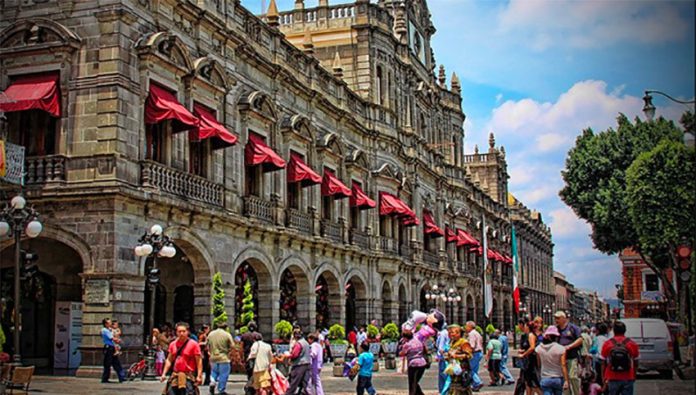Almost three-quarters of Mexican adults feel unsafe in the city where they live, according to a new security survey that found that Puebla is seen as the least safe city in the country.
Conducted by the national statistics agency Inegi in December, the 26th National Survey on Urban Public Security found that 72.9% of respondents across 70 cities believe that the place where they live is unsafe.
The figure is 1.6% higher than that detected by Inegi’s previous survey in September but 0.8% lower than the 73.7% of respondents who said that they felt unsafe in December 2018.
Almost eight in 10 women said they consider their city unsafe, whereas just under seven in 10 men said the same. The difference between genders is similar to that seen in previous surveys.
The perception of insecurity was highest in Puebla, where 92.7% of survey respondents said they felt unsafe.
Located about 130 kilometers southeast of Mexico City, the state capital is not as notorious for crime as some other Mexican cities, making the survey result somewhat surprising.
The percentage of people who said it was unsafe jumped almost 10 points compared to September when Puebla ranked 19th.
The incidence of a range of crimes including homicide, femicide, rape and vehicle theft have increased in recent years but there was no major surge in violence in the last quarter of 2019 that would explain the spike in Mexico’s fourth largest city.
Other cities considered unsafe by at least nine in 10 survey respondents were Tapachula, Chiapas, 92.1%; Ecatepec, México state, 92%; Uruapan, Michoacán, 92%; Fresnillo, Zacatecas, 91.9%; Tlalnepantla, México state, 90.9%; and Ciudad Juárez, Chihuahua, 90.5%.
Located just north of the border with Guatemala, Tapachula is a major transit city for Central American migrants, which could be a factor in the high perception of insecurity.
Ecatepec, part of the Mexico City metropolitan area, is notorious for femicides and other crime, while Uruapan is located in Michoacán avocado country, where drug cartels are extorting growers and gangs of thieves target the crop known colloquially as green gold.

The United States Department of State recently added Fresnillo to the list of place it recommends U.S. citizens not travel due to security concerns, while Juárez recorded more than 1,400 homicides in the first 11 months of last year.
Bordering the capital to the north, Tlalnepantla is often cited as one of the most dangerous areas in the greater Mexico City area.
While the perception of insecurity is generally high across the country, there are a number of cities that buck the trend.
Fifteen recorded insecurity perception rates below 50%, with Mérida, Yucatán, and San Pedro Garza García, Nuevo León, sharing the title of Mexico’s safest cities.
Just under one in five residents (18.9%) of both the Yucatán capital – ranked second safest city in North America by a business magazine last year – and San Pedro, an affluent municipality in the Monterrey metropolitan area, said they considered their city unsafe.
Rounding out the top five safest cities as judged by the people who live in them were San Nicolás de los Garza, Nuevo León, which is considered unsafe by 31.7% of residents; Saltillo, Coahuila, 32.1%; and Los Cabos, Baja California Sur, 32.7%.
Among the other cities considered unsafe by less than half of residents were Puerto Vallarta, Jalisco; La Paz, Baja California Sur; Tepic, Nayarit; Campeche; and Tampico, Tamaulipas.
The Inegi survey also asked respondents to specify the places in their cities where they felt most unsafe. The top response was bank machines in the street followed by public transit, banks, the streets and highways. More than a quarter of respondents said that they felt unsafe at home, and 29.2% and 39% respectively said they had security concerns at school and work.
The survey found that the navy is seen as the most effective crimefighting force, with 85.5% of respondents saying that it is very or somewhat effective in preventing and combating crime, followed by the army, the National Guard and Federal Police. Less than half of respondents rated state and municipal police as effective in tackling crime.
While a recent poll found that 50% of Mexicans believe that Mexico’s security situation will improve in 2020, the Inegi survey found less optimism.
A third of respondents said that security conditions will remain equally as bad this year as last year (2019 most likely set a new record for homicides) while an additional 28.9% predicted that the situation will deteriorate further in 2020.
Mexico News Daily readers were even more pessimistic. Asked if they believed the security situation would improve this year, 81% said no in the MND Poll published January 6.
Mexico News Daily
